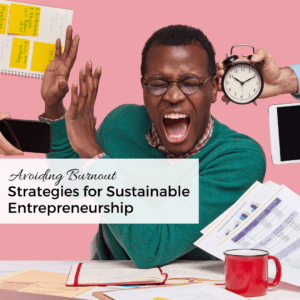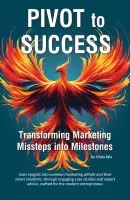- +1 512-591-8295
- [email protected]
- Mon - Fri: 9:00 - 16:00

Entrepreneurship can feel like the ultimate dream: you build something from the ground up, you’re your own boss, and you get to bring your vision to life.
But along with the freedom and rewards come long hours, financial pressures, and the constant grind. For many entrepreneurs, this relentless grind can take a toll—leading to burnout.
Burnout isn’t just about feeling tired. It’s emotional exhaustion, losing motivation, and sometimes even questioning why you started in the first place.
But here’s the good news: burnout isn’t inevitable. By recognizing the early signs and adopting sustainable practices, you can maintain both your passion and your business’s growth.
Kelly had always been passionate about fashion.
She launched her online boutique with a clear vision, and through hard work and creativity, it took off. Sales skyrocketed, and within two years, she was operating a seven-figure business.
But as her business grew, so did the demands. She found herself juggling product sourcing, marketing, customer service, and managing her rapidly growing team.
The excitement of growth soon faded. Kelly was working 16-hour days, trying to keep up with everything. She barely slept and missed out on time with her family. The pressure became overwhelming, and the passion she once had for her business turned into anxiety and exhaustion.
Kelly hit a wall. She felt disconnected from her business, overwhelmed by the day-to-day demands, and was running on empty. She found herself either getting snippy and short-tempered with team and family, or getting really forgetful because so much was going on.
She realized that if something didn’t change, she was going to lose everything she’d worked for—not because of market failure, but because she was burned out.
Her turning point came when a mentor pointed out the obvious: Kelly couldn’t do it all alone. She needed help. This wasn’t a failure; it was simply the next step in her business’s evolution.
Kelly contacted me to help with her marketing, but in talking to her further, what I realized is that she actually FIRST needed a COO – head of operations. While we set up processes and SOPs for her marketing and trained her new marketing specialist, Kelly focused on finding someone to help manage overall operations and made sure they were well trained (and all while her marketing was working like it was on autopilot!)
This allowed her to step back from the daily grind, and focus on her Zone of Genius in her business and the areas that she loved most—product development and brand strategy. This decision not only saved her from burnout but reignited her passion for her business.
Mark was a believer in “hustle culture.”
Caveat here … I hate the word “hustle”. Hustle often carries a double-edged meaning—on one hand, many people feel it represents hard work and determination to succeed, but it also takes on a more negative connotation, implying deceptive tactics or manipulating others to get ahead, much like a con man who prioritizes quick wins over genuine effort and integrity. Either way, it leads to burnout.
When Mark started his marketing firm, he prided himself on working harder than anyone else. He was at his desk at 6 AM, often staying there until midnight. He believed that his success was directly tied to how many hours he worked, and for a while, this seemed to pay off. His business was growing, clients were happy, and the revenue was increasing.
But … clients usually don’t care how hard you work or how many hours you work; they care about the results of whatever amount of time.
The cracks started to show. Mark’s creativity began to wane. He was tired all the time and found himself unable to focus on the big-picture strategy that had once been his strength. He began to dread Monday mornings, even though he didn’t understand exactly why since he worked all weekend every weekend anyway.
The constant hustle had left him physically and emotionally drained.
Mark’s turning point came when he realized that the very thing he thought was driving his success—nonstop work—was actually becoming a barrier to growth. His firm wasn’t performing as well because he wasn’t at his best. In the midst of this, he started rethinking his approach to work.
That’s when he reached out to me about possibly merging our businesses, with him being a freelancer who just worked on the projects of the clients that he brought to the table.
I wasn’t looking for a partner or merger at the time, and instead agreed to mentor Mark through some discussions about the future of his business.
One thing we quickly agreed on was that sustainable success wasn’t about hustling harder; it was about working smarter. Mark began delegating tasks to a virtual assistant that I was able to connect him with, and even took weekends off—something he hadn’t done in years.
He restructured his business model to allow more balance and began outsourcing parts of the business that didn’t require his direct input, and took an entire type of project that he didn’t enjoy – branding – and started referring those clients to us instead, with us working closely together with him and then handing the client back once our piece of the project was completed.
Yes, we love working closely with other businesses when it’s a great fit, will take excellent care of your client while they are with us, and seamlessly reconnect them with you when the time is right.
By building a team and trusting them with day-to-day operations, Mark was able to focus on growing the business strategically, without sacrificing his health or happiness.
Burnout doesn’t happen overnight. There are early warning signs—if you know what to look for (and then actually pay attention and make some strategic changes). Unfortunately, many entrepreneurs ignore these signs until it’s too late.
Exhaustion: If you feel drained or emotionally distant from your work, it’s a key sign of burnout. You may find that tasks that used to excite you now feel like a burden.
Declining Motivation: When you first started your business, you were fueled by passion. If that passion starts to fade or disappear altogether, it could be a warning sign.
Physical Symptoms: Stress often manifests physically before we realize what’s happening mentally. Frequent headaches, muscle tension, or even chronic fatigue can be indicators of burnout. Actually getting sick can as well; we all know that stress can impact your immune system, and sometimes if you aren’t slowing down, your body will decide to MAKE you rest.
Procrastination or Inefficiency: If you find yourself procrastinating more than usual or struggling to focus on tasks you once handled easily, it may be because you’re mentally overloaded.
Mood changes: if you find yourself getting short-tempered, getting upset or emotional, being more forgetful than usual, or sometimes even being “fake” happier than usual, your emotions may be compensating.
Recognizing these signs early can give you the chance to course-correct before you hit a breaking point.
If you’re already feeling the symptoms of burnout—or want to avoid them entirely—there are concrete strategies that can help. These aren’t quick fixes; they’re long-term adjustments to how you approach your business.
One of the most effective ways to avoid burnout is to focus on what you do best—your Zone of Genius. This is the area of your business that only you can handle, where your unique skills and passion come together. And hopefully something that you actually LOVE doing.
Everything else? Delegate it.
For example, Kelly was burning out because she was trying to do everything herself. By hiring a COO, she was able to step back from tasks that drained her energy and focus on product development—the part of her business she truly loved. This not only relieved her stress but also allowed her business to grow even faster because it was being managed by people with the right expertise.
At Vicky Wu Marketing, we often talk to entrepreneurs about the importance of staying in your Zone of Genius. Outsourcing tasks like marketing, operations, or even customer service can free up your time to focus on the aspects of your business that only you can handle.
We also always recommend that you outsource to an expert FIRST. A common mistake many entrepreneurs make is outsourcing to a “VA” first – someone to take over clerical roles. Yet this involves a large up-front commitments of the business owner on making sure they are properly onboarded and ongoing direction for strategy.
By outsourcing to an expert first instead, the strategies and operating procedures and processes can be established, so that as soon as you later onboard someone for a clerical role, everything is ready to go.
Many entrepreneurs blur the lines between work and personal life, especially when they love what they do. But without clear boundaries, it’s easy to let work consume every hour of the day—and that’s a fast track to burnout.
Mark, for example, discovered that setting boundaries—like no work on Sundays—gave him the space to recharge. This break from work actually made him more productive during the week because he was refreshed and focused.
Sometimes it’s as simple as not answering phones or emails after established “office hours.”
Entrepreneurs need to learn to say “no” to unnecessary tasks or commitments that don’t align with their core business goals.
Taking care of your mental and physical health is non-negotiable if you want to sustain long-term success. Regular exercise, meditation, and taking time for hobbies or personal interests can keep burnout at bay.
Kelly implemented daily 30-minute mindfulness breaks and began practicing yoga, which helped her regain balance and perspective. These moments of self-care gave her the mental clarity she needed to run her business more effectively.
Another major contributor to burnout is trying to do it all—especially when it comes to marketing, since marketing encompasses SO many facets of your business. Entrepreneurs often wear many hats, but it’s not sustainable to manage every aspect of marketing on your own. A scalable system is key to reducing stress.
At Vicky Wu Marketing, we help business owners design marketing strategies that grow with them. By outsourcing tasks like SEO, social media, and content marketing to experts, you can free up valuable time while ensuring your marketing efforts are effective and scalable.
Burnout can be avoided, but it requires ongoing effort. The following long-term strategies can help you stay aligned with your vision while maintaining your well-being.
Staying connected to the “why” behind your business can be a powerful motivator.
Entrepreneurs who are aligned with their purpose are less likely to feel burned out because they’re continually fueled by their passion and vision.
At Vicky Wu Marketing, we emphasize aligning marketing strategies with the business owner’s core goals and purpose. This keeps you focused on the bigger picture, making it easier to avoid the day-to-day stress that can lead to burnout.
Entrepreneurship can be lonely, but it doesn’t have to be. Connecting with other entrepreneurs can provide emotional support and practical advice.
Mark found immense value in joining a mastermind group, where he could share his experiences, gain new insights, and receive support from peers who understood the entrepreneurial journey.
Burnout doesn’t have to be part of your entrepreneurial journey. By implementing these strategies—delegating, setting boundaries, investing in self-care, and creating scalable systems—you can avoid burnout and build a business that not only thrives but allows you to enjoy the ride.
Take the first step towards sustainable success today. Book a strategy session with Vicky Wu Marketing, where we’ll help you create a marketing plan that supports both your business growth and your well-bein.
Schedule a Free 360° Marketing Consultation
to brainstorm best marketing strategies for your business - ones that will free up your time and attention.
Get solid marketing strategies, designed for entrepreneurs on the track to 7-figures and beyond, right in your inbox.

This website uses cookies to ensure you get the best experience on our website. By continuing to use the website, you agree to our use of cookies. We do not share or sell your information. More info
